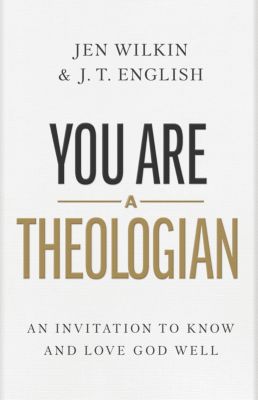
Many Christians misunderstand basic theology. What starting points can pastors give their people when it comes to properly “doing” theology?
By Jen Wilkin and JT English
In the 2022 State of Theology study, Lifeway Research and Ligonier Ministries surveyed both Christians and non-Christians on their understanding of basic Christian theology, the essential beliefs that define who is a Christian and who is not. The results among non-Christians were predictably dismal, but it’s the results among professing Christians that are particularly alarming. Consider just a few of the findings:
- God learns and adapts to different circumstances: 48% of evangelicals agree
- Everyone is born innocent in the eyes of God: 65% of evangelicals agree
- God accepts the worship of all religions, including Christianity, Judaism, and Islam: 56% of evangelicals agree
- Jesus was a great teacher, but He was not God: 43% of evangelicals agree (up from 30% in 2020)
What starting points can pastors give their congregations when it comes to properly “doing” theology? Theology is done biblically, prayerfully, worshipfully, humbly, and together in community.
1. Biblically
First, theology must be biblical. The aim of Christian theology is to reflect on God’s revelation of Himself in Scripture. Theology that is not a reflection of Scripture ceases to be Christian theology. Christian theologians pattern their words, thoughts, and worship around who God says He is and what He has done as revealed in Scripture.
“Theology that is not a reflection of Scripture ceases to be Christian theology.” — @jenniferwilkin, @jt_english Click To TweetDisciples of Jesus never graduate from Scripture. We never move past it. We never get bored with it. Scripture is the lifeblood of theology. We return to Scripture over and over again so that we may know and commune with God. He meets us there. He reveals Himself there. And He speaks to us there. The Bible is our primary authority, because in Scripture God makes Himself known to us.
2. Prayerfully
Not only must theology be biblical, but it also must be prayerful. Theology begins and ends with prayer. The task of theology is best done on our knees, asking God, by the power of the Spirit, to awaken our hearts and minds to the person and work of Christ in the Scriptures.
In prayer, we begin to see God and ourselves rightly. We have the opportunity to attend to God as our Creator and Redeemer, and we ask Him to help us, His creatures, with the task of theology. We ask the Holy Spirit to illuminate our darkened hearts and minds so we can know God truly. Prayerless theology is likely prideful intellectualism. We can’t know God unless He makes Himself known to us, which is why we pray. In the matter of theological growth, let it never be said of us that we did not have because we did not ask.
3. Worshipfully
Theology is also meant to be worshipful. It is not meant to make us love theology more but to love God more. Theology is distinctly relational, not drearily informational.
In current Christian subculture, it is sometimes reflected that knowledge just puffs up. Any intellectual expression of faith veers dangerously toward the example of the Pharisees. In short, too much thinking will kill worship. But theology and worship are not adversarial. They are two sides of the same coin. Theology is loving God with our minds.
Theology is meant to lead us into greater worship of God, and worship of God is meant to lead us into greater knowledge of God. Doctrine and doxology fuel each other. Everything we learn about God should yield worship of God.
“Doctrine and doxology fuel each other. Everything we learn about God should yield worship of God.” — @jenniferwilkin, @jt_english Click To Tweet4. Humbly
Theology is also meant to be a work of humility. Theologians never strut. Fundamentally, a disciple is a learner. Everything you have ever learned required humility in the process, because anything worth learning requires practice to become proficient. With theology, we are doing more than simply learning a skill. We are humble theologians because we cannot know God unless He makes Himself known to us. All knowledge of God is given by God. It is an act of grace for God to make Himself known to us. To know God is to know grace. Therefore to know God is to grow in humility.
There is no room for pride in theology. A prideful theologian is a contradiction of terms. All theology is meant to be marked by Spirit-driven humility. If your theology is leading you into pride, throw it away and get a better theology. If your theology is leading you to deeper humility, then keep pressing forward because you are being transformed into the image of Christ, which is the goal of all theology.
5. In community
Last, but certainly not least, theology is meant to be done together, in community. And by community, we mean both our contemporary communities and the historic church. God has given you a context, a community, and relationships for a reason. God is calling you to engage theologically in your relationships.
In the context of the local church, we are able to learn about God from other people in our immediate setting and they from us. There is no such thing as a lone-ranger theologian. When we do theology together, we are testifying to the God-ordained truth that we need one another. None of us is sufficient for the theological task as an individual, but when we come together to do theology, we learn from one another. Men, women, young, old, various socioeconomic backgrounds, and diverse ethnicities—we help one another by learning from one another.
“When we do theology together, we are testifying to the God-ordained truth that we need one another.” — @jenniferwilkin, @jt_english Click To TweetIn the context of the global church, we are able to learn about God from our contemporaries in widely different cultural settings than ours. Different life experiences contribute to different vantage points and lenses through which we see the Scriptures. We’re all looking at the same beautiful gospel diamond, but brothers and sisters from different parts of the world, with different backgrounds, see different facets of the diamond with greater clarity.
In the context of the historic church, we are able to learn about God from our predecessors in widely different historic and cultural settings than ours. The Holy Spirit has been teaching, nourishing, and guiding the church into truth for the last two thousand years. When we invite our brothers and sisters from previous centuries into conversation with us, we invite God’s wisdom from previous centuries into our lives.
For permission to republish this article, contact Marissa Postell Sullivan.

Jen Wilkin
Jen is an author and Bible teacher from Dallas, Texas. She has organized and led studies for women in home, church, and parachurch contexts. Her passion is to see others become articulate and committed followers of Christ, with a clear understanding of why they believe what they believe, grounded in the Word of God.

JT English
JT is the lead pastor at Storyline Church. Before joining Storyline, JT served as a pastor at The Village Church. He received his ThM from Dallas Theological Seminary and his PhD in Systematic Theology from Southern Seminary.
Excerpted with permission from You Are a Theologian: An Invitation to Know and Love God Well, by Jen Wilkin and J.T. English. Copyright 2023, B&H Publishing.












